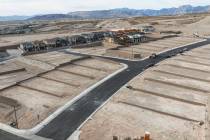Thousands request mediation
More than 90,000 notices of default were recorded against residential and commercial property owners in Nevada in the past 12 months, according to a statement released by the Administrative Office of the Courts, which oversees the Nevada Foreclosure Mediation Program state lawmakers established in 2009.
A statement released to mark the program’s first year in operation said, "The FMP was created by the 2009 Legislature to help families work with lenders during the devastating foreclosure crisis that has swept across the state."
Tens of thousands of foreclosed property owners, such as speculators and commercial property owners, don’t qualify for the program.
The program puts borrowers and lenders together to redraft mortgages that more accurately reflect the borrowers’ ability to pay. To qualify, the property has to be the owners’ primary residence with the foreclosure process beginning on or after July 1, 2009.
Out of the 90,279 notices filed, 11,716 requested mediation, according to the court office. Of that number, 3,860 mediations have been completed and 88 percent of those ended with the homeowner staying in the home. The remaining 12 percent, 445 cases, were allowed to go to full foreclosure.
The program includes 270 trained mediators.
Only 2,284 cases, 59 percent of successful mediations, resulted in a new mortgage agreement between the two parties, and 1,131, or 29 percent of the cases, resulted in a family staying in the home due to "noncompliance" by lenders. These borrowers are subject to future default actions.
Lenders can be noncompliant by failing to appear for a scheduled mediation, not sending someone with the authority to negotiate a loan modification and for not bringing pertinent documents.
More than 600 homeowners who requested mediation voluntarily surrendered their homes through short sales, cash for keys or through getting a lender’s commitment they wouldn’t seek future repayment on a defaulted loan.
And while there is no figure, it was noted "some mediations" ended when homeowners realized they still couldn’t make payments following a modification.
"Our first-year statistics truly demonstrate the progress and potential of the Foreclosure Mediation Program," said Ron Titus, director of the Administrative Office of the Courts, which was tasked with the program’s oversight.
Mediators have been busy. While the program has been around for a year, at its inception it was without a computerized case management system or trained mediators. The program evolved from scratch and has received high marks from other jurisdictions, according to Titus. The first negotiations began Sept. 14.
"I couldn’t be prouder of our staff and the many individuals who worked so hard to establish our unique and effective program, which has become a national model," Titus said.
Titus said a backlog of cases remains, but he expects the second year to be "much smoother" than the first.
Efficiency will be required. According to program manager Verise Campbell, lenders continue to file a record number of default notices.
"Although we have processed thousands of requests for mediations during the program’s first year, notice of default filings remain high, which has resulted in a tremendous demand on the program," Campbell said.
Contact reporter Doug McMurdo at dmcmurdo @reviewjournal.com or 702-224-5512 or read more courts coverage at lvlegalnews.com.
NUMBERS90,279
notices of default were recorded against residential and commercial property owners in Nevada in the last 12 month
July 1, 2009
earliest date that foreclosure process could have started to qualify for the program. The property also has to be the owners’ primary residence
11,716
owners who received notices requested mediation
88%
of mediations ended with the homeowner staying in the home.
59%
of successful mediations resulted in a new mortgage agreement
29%
of the cases resulted in a family staying in the home due to “noncompliance” by lenders. They are subject to future default actions.


















